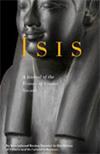Sima Qian's Ambition and Needham's Vision: A Comment on The History Manifesto from China's Perspective.
IF 1
2区 哲学
Q2 HISTORY & PHILOSOPHY OF SCIENCE
引用次数: 1
Abstract
he History Manifesto is of considerable significance to historians of science in China, which since 1978 has seen great changes and rapid economic development. Yet in the shadows of the tremendous advances lurks crisis. It has been observed that “many important nonconsistent issues in economic performances and policies appeared repeatedly in the past, and may very likely recur in the future. . . . A reason for the crisis in current economics is that many economists do not take history seriously.” Take regional economic imbalances, for example: the wealthiest regions in eighteenth-century China are still the wealthiest today, while most of the regions that were poorest then continue to be plagued by poverty. Some causes of this wealth discrepancy can be found in the policies of the past thirty-eight years, but the root of the problem may be traced to the “Great Divergence” over two centuries earlier, at which time the economy of the southern regions of the Yangtze River rivaled that of England, as Kenneth Pomeranz has pointed out.7 China has a long-standing tradition in historiography. Sima Qian’s (Ssu-ma Ch’ien; ca. 145– ca. 86 b.c.) expressed aspiration—“to examine all that concerns heaven and man, to penetrate the changes of the past and present”—is considered the pinnacle for historians.8 The Institute for the History of Natural Science of the Chinese Academy of Sciences uses Sima’s adage as its motto. His Shiji [Records of the Grand Historian] was pioneering in including as part of the official history tradition (i.e., dynastic history) literature on astronomy and calendar making, music and acoustics, geography, metrology, hydraulic engineering, and economics. The study of climate change in China, spanning five millennia, by Zhu Kezhen (Zhu Ko-chen) and the compilation by Xi Zezong of nova and supernova records in Chinese history are examples that show earlier Chinese historians of science studying nature using historical accounts accumulated over a long period.9 Some of the criticism leveled at Jo Guldi and David Armitage centers on their overemphasis on the longue durée. In my opinion, however, the main argument in The History Manifesto does not pertain to a comparison between the merits of the long term and the short term; rather, the manifesto appeals to contemporary historians to have a broad vision and to write history from a macro-historical perspective, so as to arouse public interest in history and encourage historians to play a more active role in political decisions and public affairs. I believe司马迁的野心与李约瑟的愿景——中国视野下的《历史宣言》评析。
本文章由计算机程序翻译,如有差异,请以英文原文为准。
求助全文
约1分钟内获得全文
求助全文
来源期刊

Isis
管理科学-科学史与科学哲学
CiteScore
1.00
自引率
16.70%
发文量
150
审稿时长
>12 weeks
期刊介绍:
Since its inception in 1912, Isis has featured scholarly articles, research notes, and commentary on the history of science, medicine, and technology and their cultural influences. Review essays and book reviews on new contributions to the discipline are also included. An official publication of the History of Science Society, Isis is the oldest English-language journal in the field.
The Press, along with the journal’s editorial office in Starkville, MS, would like to acknowledge the following supporters: Mississippi State University, its College of Arts and Sciences and History Department, and the Consortium for the History of Science, Technology, and Medicine.
 求助内容:
求助内容: 应助结果提醒方式:
应助结果提醒方式:


